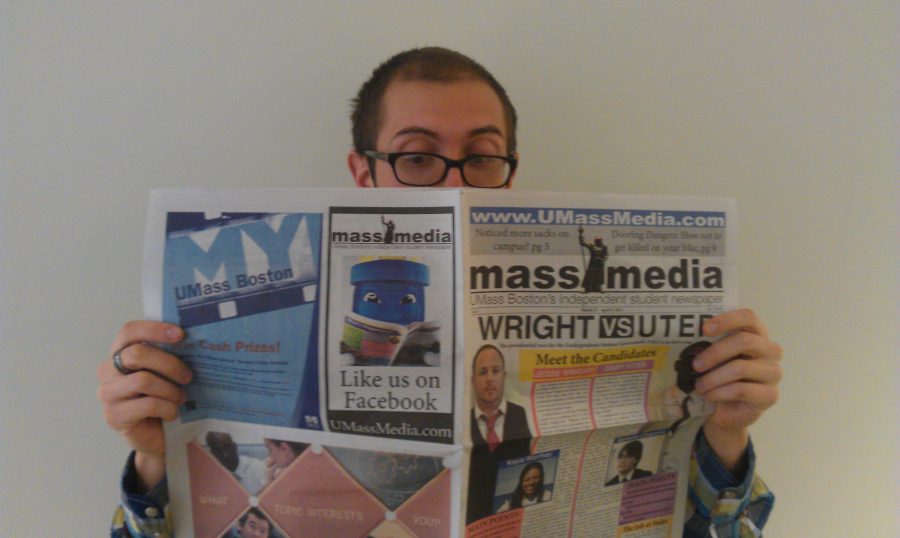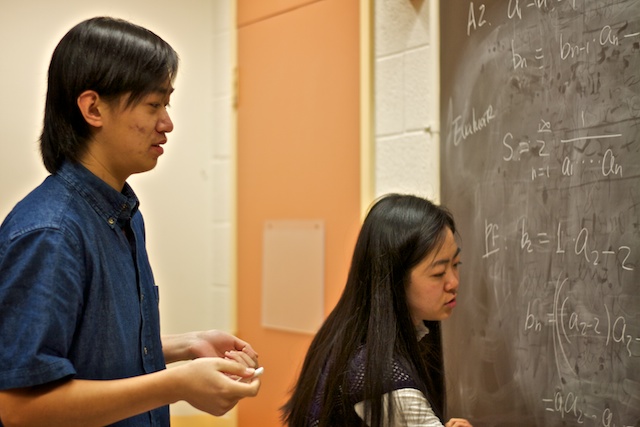The William Lowell Putnam Mathematical Competition is considered to be one of the most prestigious university-level mathematics examinations in the world, and UMass Boston’s team placed 21st out of the 460 participating colleges in 2011.
The test, given every December, was especially hard this time around. The top score was 91 out 120 points, and only eight individuals scored over 60 points. Out of 4,440 participating students, 2,066 scored zero. A score of 10 points meant placement in the top 20 percent.
This year, UMass Boston’s team consisted of Joshua Rosenberg, Yuting (Juno) Zeng and Tianmou Liu.
Any undergraduate student enrolled in a U.S. or Canadian college is eligible to take the Putnam exam. Each student can take the exam a maximum of four times in his or her lifetime. At UMass Boston, students who participate in the Putnam Competition are encouraged to attend a problem-solving seminar during the fall semester. Organized by Professor Catalin Zara of the math department, the seminar is designed to develop students’ problem-solving skills and prepare them for the competition.
Each student takes the Putnam test individually. The team ranking is made up of the combined rankings of three students, not necessarily the top three, but the ones chosen by Zara before the test is administered. The test is given on the first Saturday in December, and consists of 12 questions and two three-hour sessions, one in the morning and one in the afternoon.
Joshua Rosenberg, who has participated in the Putnam Competition four times, was ranked in the top 5 percent with 23 points.
“I did not attend professor Zara’s problem solving seminar this year but I did consult with him on a regular basis and I have attended it informally in past years,” Rosenberg said.
“I believe the success of the UMass Boston team is attributable, in large part, to his teaching and ability to get students actively engaged in his seminar. He is a phenomenal problem solver and I think that his ability and enthusiasm instills confidence in his students.”
Rosenberg’s name appears on this year’s list of the top 500 Putnam contestants, which is distributed to all participating institutions. Rosenberg plans to pursue a PhD in mathematics next fall, tentatively at the University of Pennsylvania.
Yuting Zeng, a math major, economics minor, and the head of the math club, got 13 points. She said that she is proud of her score.
“I took the Putnam three times. I got three points the first time, 21 points the second time and 13 points this time, but my ranking this year is the highest. I ranked in the top 25 percent last time, and this time I was in the top 10 percent. I’m glad I’m making progress.”
Zeng encouraged other students, especially math majors, to participate in the Putnam Competition, a sentiment that was shared by her teammate Tianmou Liu.
“Nobody should be afraid of taking the Putnam contest,” Liu said. “So many students get zero, that it’s not a big deal. We all have a long way to go. If you get a zero, you may get a higher score next time. Who knows?”
This was Liu’s first time participating in the competition, but he said he wasn’t nervous because he didn’t set his expectations high.
“During the test I thought I solved six problems out of the 12, but Professor Zara looked at my results after I gave him the test and he said that I got five answers right but that my solutions were not good enough.”
Liu ended up getting 10 points, placing him in the top 20 percent. He said that he definitely plans to take the Putnam test again next December, along with Zara’s problem-solving seminar, which he described as “the sweetest memory of my mathematical learning.”
The top five teams in the 2011 Putnam Competition came from Harvard, Carnegie-Mellon, Caltech, Stanford and MIT.






















































